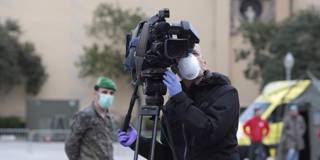Even before the COVID-19 pandemic, many journalists were burned out or on the brink. As the crisis both intensifies pressure on newsrooms and upends decades-old journalistic practices, the risks to their mental health are mounting.
LONDON – Nothing highlights the importance of reliable news quite like a crisis. And yet, as the COVID-19 pandemic puts journalists under intensifying pressure to deliver that news, it is also upending their industry and transforming their working conditions. The stress this is placing on their mental health should not be underestimated.

LONDON – Nothing highlights the importance of reliable news quite like a crisis. And yet, as the COVID-19 pandemic puts journalists under intensifying pressure to deliver that news, it is also upending their industry and transforming their working conditions. The stress this is placing on their mental health should not be underestimated.